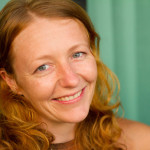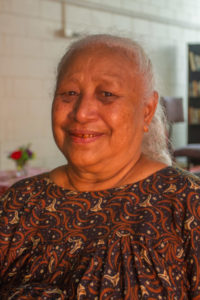From the Gravesite to the Stage
Nori Vagi Brash speaks about her life as a Papua New Guinean poet, writer, and social activist
You probably haven’t heard of Nora Vagi Brash, and you might need a map to locate Papua New Guinea, but on this exotic island of the South Pacific, Nora is respected as one of the most outstanding playwrights and poets in the region, and the only female playwright published in the country.
Having grown up in a village on the outskirts of Port Moresby, Nora has spent her life reflecting on the norms of society. In an environment of post-independence change, her plays, poems, short stories and puppet shows discussed the challenges of transitioning into a country’s independence, and the merging of Western and traditional practices.
Through her work, Nora hopes to encourage a constant re-evaluation of the norms and values of society, and to have a giggle at the same time.
Kiara Worth spoke to Nora Vagi Brash about her writing career.
Q: How did you become a writer?
A: I started writing when I was about seven years old. My father and grandmother had passed away and I was fascinated by their burial sites, the smell of the earth, the way the moonlight fell on the trees. I would sit by the grave and write poems.
Papua New Guinea has strong cultural beliefs, so people thought I was strange, getting wisdom from the spirits to do magic! But that’s how I started writing.
I did amateur theatre and radio plays during the 1970s, and became creative director of the Papua New Guinea National Theatre Company, which toured local villages to do performances and raise social awareness.
Q: How do you decide what to write about?
A: Mostly from watching the world go by. I notice the small things that people do, how they behave, and so they form characters in my mind.
Some ideas are triggered by sensory memory. One day I bought a piece of chewing gum from the market, and the taste suddenly reminded me of when I was a young girl. I had a flood of memories and stories that I immediately had to write down.
My greatest achievement is the idea that my writing has helped people to reflect more critically on their society and make changes.”
Q: What has been your greatest achievement?
A: My greatest achievement is the idea that my writing has helped people to reflect more critically on their society and make changes. There are many injustices in Papua New Guinea, and my play ‘Which Way Big Man?’ was of my favourites. It made fun of corrupt politicians, people wheeling and dealing at the expense of other people, and actions contradicting traditional values. Story-telling is an important part of our culture – most people are illiterate and the best way to impart information is through stories.
I was once called ‘bawdy and disreputable’; that was pretty good.
Q: What advice would you give aspiring writers?
A: You can’t tell yourself to be creative; it’s something that must come, something that flows through you. Write from the inside, and write about things that are important. Also, save your work! At times I’ve been so inspired by the writing that I didn’t save properly – computers were a new thing in those days – and I lost everything. I’ve never been able to capture those stories the same way!
Q: What advice would you give for getting published?
A: Don’t expect to get published immediately, especially in a country where the industry is not well-established. My stories have been published in different compilations, poetry books, and theatre productions – the more you can diversify your writing, the more opportunity you will have of being published.
Quick Facts about Nora:
- She has written 14 plays the most notable of which are Which Way Big Man?, Taurama, High Cost of Living Differently, and Black Market Buai.
- She won the Independence Medal in 1985 for her play Taurama.
- Her poetry has featured in numerous journals and publications, and she has attended 15 conferences and workshops internationally to share her work.
- She was one of two artistic directors for the PNG National Theatre Company.
- She was the deputy chairperson for the PNG National Cultural Council and board member of the Board of Institute of PNG Studies.
Interesting links:
- Published works by Oxford University Press: Which Way Big Man and five other plays, Toromuimui, and Grandpa’s Memories
- Writings of Nora Vagi Brash: http://www.tanorama.com/nvb.htm
- About Papua New Guinea: http://www.papuanewguinea.travel
- Stories and photographs from Papua New Guinea: http://kiaraworth.com/category/writing/papua-new-guinea-writing/
About the Author:















